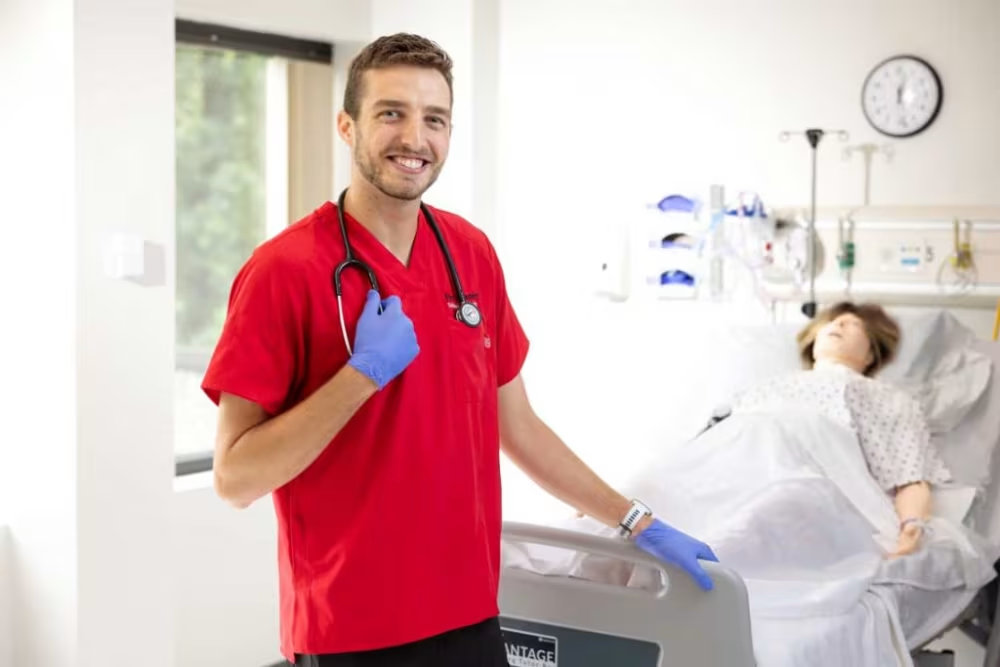How to Go from LPN to RN with an Accelerated Nursing Program
Each blog post is dated and contains accurate information as of that date. Certain information may have changed since the blog post publication date. If you would like to confirm the current accuracy of blog information, please visit our ABSN overview page or contact admissions at (866) 892-3819.
Wondering how to go from LPN to RN? Compared to LPNs, RNs have a greater scope of responsibility and more autonomy. They also have stronger salary potential and more opportunities for career advancement. To go from LPN to RN, earn your BSN at an ABSN program and pass the NCLEX-RN.

Licensed practical nurses (LPNs) fulfill an important role in patient care across various healthcare settings. Yet, their scope of responsibilities is limited, as is their advancement potential. If you’re an LPN who is craving something more for your career, consider transitioning from licensed practical nurse to registered nurse (RN). Learning how to go from LPN to RN is simpler with Northeastern University.
Our Accelerated Bachelor of Science in Nursing (ABSN) program provides a pathway for current healthcare workers, as well as those from non-healthcare backgrounds, to earn a Bachelor of Science in Nursing (BSN) in less time than a traditional BSN program.
If you’re eligible to apply, you could earn your nursing degree in as few as 16 months upon successful completion of prerequisites. It’s a faster way to take your career to the next level.
Before you decide to make the switch from LPN to RN, you might want to learn about the differences between these two nursing roles. Then, consider the advantages of choosing an ABSN program and learn what to expect as you make your career transition.
What’s the Difference Between a Licensed Practical Nurse and a Registered Nurse?
Both LPNs and RNs are professional nurses who provide direct patient care. LPNs, however, have a more limited range of responsibilities and autonomy compared to RNs. LPNs can monitor patients’ vital signs, change bandages and discuss patients’ concerns with them, relaying those concerns to RNs. LPNs also assist patients with the activities of daily living (ADLs), such as dressing and grooming.
Registered nurses can do everything that LPNs can do, but can also:
- Administer medications and treatments without RN supervision
- Develop and contribute to patient care plans
- Make clinical decisions
- Perform head-to-toe assessments
- Set up and operate medical equipment

RNs have a greater scope of responsibility and more autonomy than LPNs because of their higher level of nursing education. LPNs must complete a state-approved LPN training program and pass the NCLEX-PN licensure exam, while RNs earn an undergraduate degree, such as an Associate Degree in Nursing or a BSN, and pass the rigorous NCLEX-RN licensure exam.
In short, when comparing a licensed practical nurse to a registered nurse, RNs:
- Deliver more patient care
- Can choose from a much wider range of specialties
- Can make clinical decisions
- Can work in more types of settings
- Have greater opportunities for advancement
- Work with greater autonomy

There are many nursing specialties to consider when you’re working toward an RN career. Explore some top nursing specialties in demand today.
Why Consider an ABSN Program to Transition from LPN to RN?
When figuring out how to go from LPN to RN, the ABSN program at Northeastern University is worth your consideration.
As a nursing professional, you probably won’t want to put your career on hold for four years to complete a traditional BSN program. The Northeastern ABSN program allows you to earn a BSN in as few as 16 months upon successful completion of prerequisites. That means you can re-enter the nursing workforce fast and enjoy the salary command of an RN.
Another perk of choosing our ABSN program is its hybrid approach to learning. You can complete your coursework online from wherever you concentrate best. You’ll develop advanced nursing skills in the in-person nursing skills and simulation labs, and you’ll gain experience with the responsibilities of an RN during your clinical rotations.
Furthermore, the ABSN program is ideal for career switchers, as its nursing cohorts are made up of nontraditional students from a variety of backgrounds and age ranges.
Steps to Become a Registered Nurse
While prior healthcare experience isn’t required to become an RN with an ABSN program, having experience as an LPN can certainly give you a boost. You’ll already be familiar with the clinical environment and nursing terminology. You can emphasize your nursing experience on your application to increase your chances of acceptance.
Once you’re accepted into the ABSN program at Northeastern University, you’ll complete online coursework to learn advanced nursing concepts. You’ll also attend in-person labs and clinical rotations.
After earning your BSN, you’ll be qualified to take the NCLEX-RN. When you pass, you can obtain your state-issued nursing license and begin working as a registered nurse.
Discover how to pay for nursing school with a blend of financial aid, scholarships and other options.

Advantages of Transitioning from LPN to RN
If you’re feeling frustrated with your role as an LPN, you may appreciate the greater responsibility of an RN. You will provide more direct patient care, taking charge of your patients in a way you’re unable to as an LPN. You will exercise independent clinical decision-making, enjoy more autonomy, and function as a higher-level member of the nursing team.
Other compelling reasons for going from LPN to RN include:
Salary
According to the U.S. Bureau of Labor Statistics (BLS), LPNs made a median annual salary of $62,340 as of May 2024. RNs can typically command a higher salary. The BLS notes that RNs made a median annual salary of $93,600 as of May 2024.
Job Growth
Although both LPNs and RNs play a vital role in patient care, the demand for RNs is greater. The BLS projects the job growth rate for LPNs to be 3% from 2023 through 2033, as fast as average. This indicates that healthcare employers expect to hire about 16,900 new LPNs during this period.
In contrast, the BLS projects the job growth rate for RNs to be 6% from 2023 through 2033, faster than average. Healthcare employers are expected to hire about 197,200 new RNs in the coming years.

Nursing Specialties
LPNs have access to certifications that enable them to expand their work duties and specialize in a particular area. These include wound care, gerontology and IV therapy.
In contrast, RNs have access to an incredibly diverse range of nursing specialties. You could specialize in trauma care, critical care, neonatology, adult-gerontology, pediatrics, dermatology or any of the countless other nursing specialties available to RNs.
Advancement Opportunities
After working as an LPN for a while, you might start to feel stuck in your career trajectory. There are limited opportunities for advancement in this role. In contrast, RNs have plenty of advancement opportunities available to them.
Some nurses go on to become charge nurses, for example, while others go back to school and obtain board certification as advanced practice registered nurses (APRNs). There are also opportunities in nursing education, research, administration and management.

Nursing school can be challenging. Try these 10 nursing school tips to successfully navigate the curriculum.
Earn Your Nursing Degree at Northeastern University
Northeastern University welcomes LPNs who are interested in taking their healthcare career further with a BSN. Our Accelerated BSN programs are available near Boston, Massachusetts; Providence, Rhode Island; and in Charlotte, North Carolina.
With three start dates each year and a dedicated admissions counselor to help you navigate the application process, you could get started sooner than you’d think.
Our students enjoy our small class sizes, which allow for personalized attention. We support each student on their journey to becoming a nurse, providing resources and access to our talented and dedicated faculty. Plus, our hybrid learning approach makes nursing education flexible and accessible.
Contact an admissions counselor today to discover if our ABSN program could be the right fit for you.
